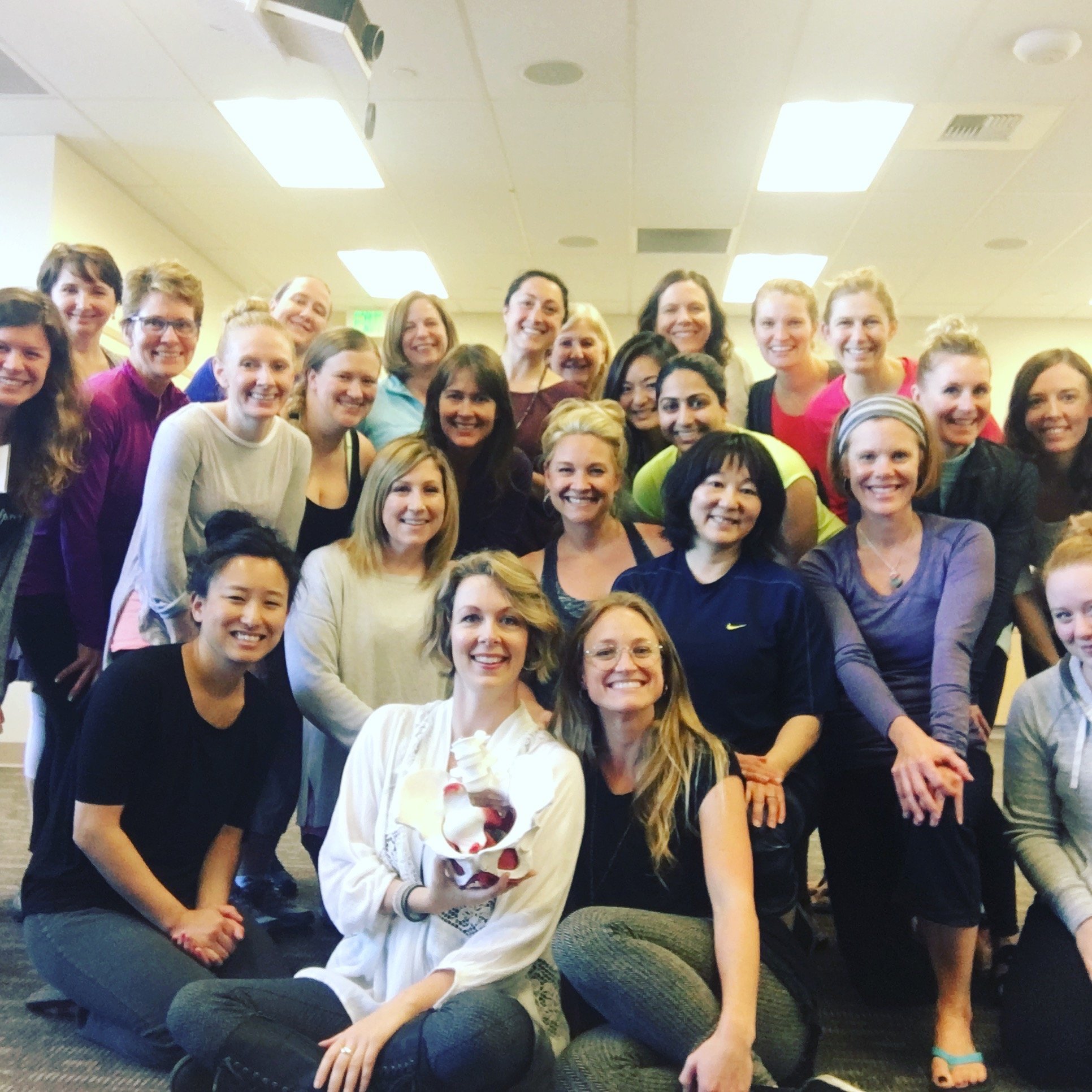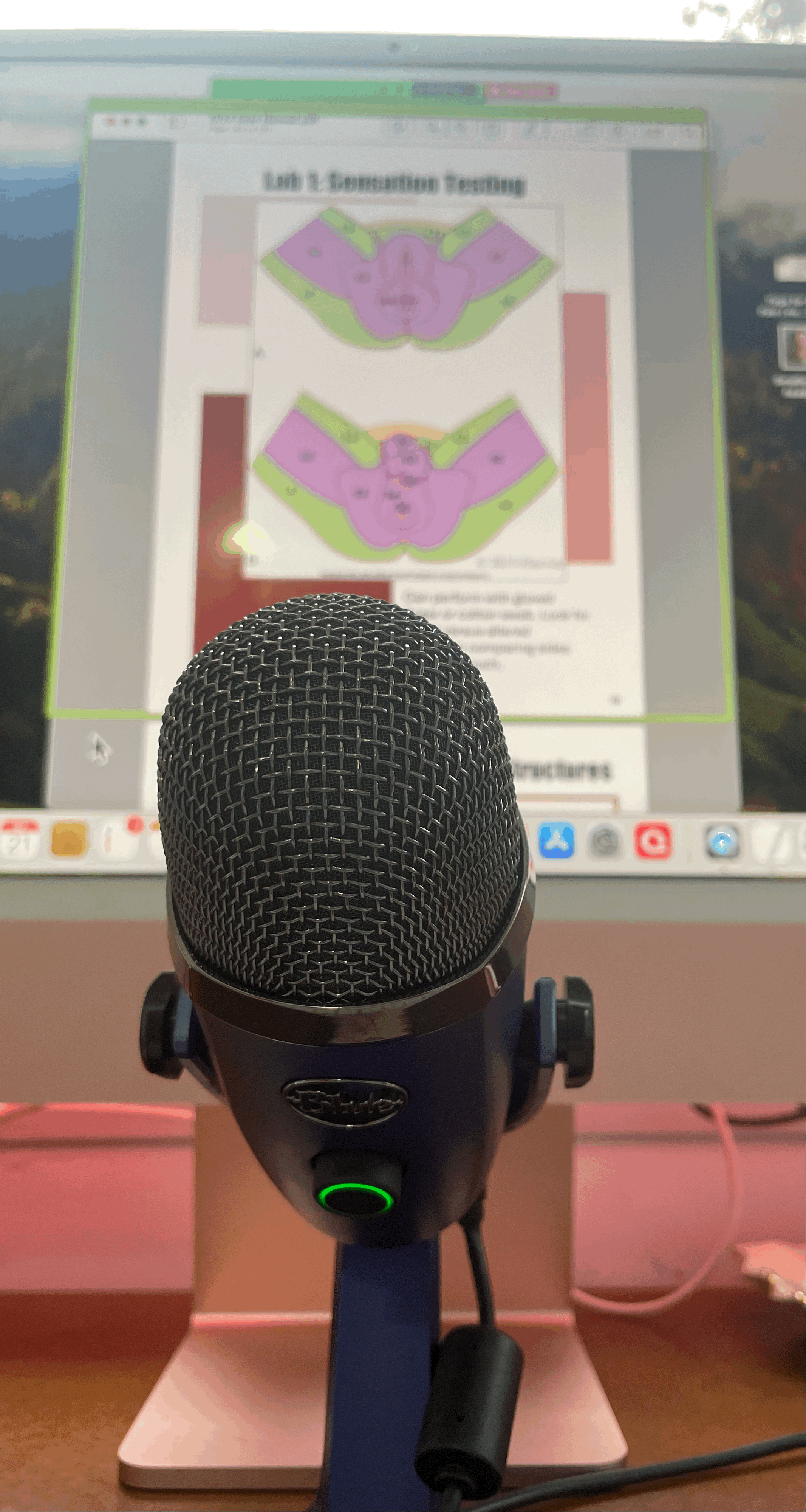
Upcoming events and media

Yoga for Pelvic Pain: two day continuing education course
This two-day experiential continuing education course, developed by Dustienne Miller CYT, PT, MS, WCS offers participants an evidence-based perspective on the value of yoga for patients with chronic pelvic pain. This course will focus on two of the eight limbs of Patanjali’s eight-fold path: pranayama (breathing) and asana (postures) and how they can be applied for patients who have hip, back and pelvic pain. A brief history of yoga and yoga principles will be introduced, and research relating to the neuroscience of yoga and mindfulness will be presented. The course will be held via Zoom meeting, which is free to download, and will combine pre recorded lectures with live, interactive course time that takes place via online meeting. Participants will receive pre recorded lectures in order to maximize the interactive, in-person time spent on Zoom.
A variety of pelvic conditions will be discussed including interstitial cystitis/painful bladder syndrome, vulvar pain, coccydynia, hip pain, and pudendal neuralgia. The course will describe the role of yoga within the medical model, discuss contraindicated postures, and in how to incorporate yoga home programs as therapeutic exercise and neuromuscular re-education both between visits and after discharge. Learning will be gained through lecture, demonstration, and in small group practice. Participants will be able to demonstrate newly acquired knowledge on the second day of the course by creating home programs, allowing the clinician to integrate yoga home programs immediately upon returning to work. In addition to learning how to create yoga interventions for patients who have pelvic pain, the therapist will learn how to evaluate community resources for yoga and make appropriate referrals for ongoing yoga classes.
While no prior experience with teaching yoga is required, all participants must possess a working knowledge of pelvic pain conditions and foundational rehabilitation principles. Current evidence from fields of pain research, neurophysiology, and complementary and alternative medicine will be applied throughout this course. Patient education and home program handouts are supplied within the course manual and these documents will prepare the participant to incorporate specific yoga techniques into current pelvic rehabilitation practice.

Yoga for Pelvic Pain: two day continuing education course
This two-day experiential continuing education course, developed by Dustienne Miller CYT, PT, MS, WCS offers participants an evidence-based perspective on the value of yoga for patients with chronic pelvic pain. This course will focus on two of the eight limbs of Patanjali’s eight-fold path: pranayama (breathing) and asana (postures) and how they can be applied for patients who have hip, back and pelvic pain. A brief history of yoga and yoga principles will be introduced, and research relating to the neuroscience of yoga and mindfulness will be presented. The course will be held via Zoom meeting, which is free to download, and will combine pre recorded lectures with live, interactive course time that takes place via online meeting. Participants will receive pre recorded lectures in order to maximize the interactive, in-person time spent on Zoom.
A variety of pelvic conditions will be discussed including interstitial cystitis/painful bladder syndrome, vulvar pain, coccydynia, hip pain, and pudendal neuralgia. The course will describe the role of yoga within the medical model, discuss contraindicated postures, and in how to incorporate yoga home programs as therapeutic exercise and neuromuscular re-education both between visits and after discharge. Learning will be gained through lecture, demonstration, and in small group practice. Participants will be able to demonstrate newly acquired knowledge on the second day of the course by creating home programs, allowing the clinician to integrate yoga home programs immediately upon returning to work. In addition to learning how to create yoga interventions for patients who have pelvic pain, the therapist will learn how to evaluate community resources for yoga and make appropriate referrals for ongoing yoga classes.
While no prior experience with teaching yoga is required, all participants must possess a working knowledge of pelvic pain conditions and foundational rehabilitation principles. Current evidence from fields of pain research, neurophysiology, and complementary and alternative medicine will be applied throughout this course. Patient education and home program handouts are supplied within the course manual and these documents will prepare the participant to incorporate specific yoga techniques into current pelvic rehabilitation practice.

Pelvic Function Level 1
This first course in our Pelvic Function Series, Pelvic Function Level 1 or PF1, is designed to provide a thorough introduction to pelvic health, pelvic dysfunction, and interventions for rehabilitation. We created PF1 for the pelvic health clinician who treats patients with conditions including urinary incontinence, chronic pelvic pain (CPP), and pelvic organ prolapse. Participants will understand how diagnoses such as interstitial cystitis/painful bladder syndrome (IC/PBS), pelvic neuralgias, vulvar pain, and dyspareunia may be improved with pelvic rehabilitation. Practical, supervised, hands-on labs will include an external perineal and anorectal approach and internal vaginal examination. The information contained in this course is immediately applicable to clinical practice.

HW Connect conference - morning yoga
Morning yoga session at the Herman & Wallace Pelvic Rehabilitation conference in Seattle, WA

Pelvic Function Level 1
This first course in our Pelvic Function Series, Pelvic Function Level 1 or PF1, is designed to provide a thorough introduction to pelvic health, pelvic dysfunction, and interventions for rehabilitation. We created PF1 for the pelvic health clinician who treats patients with conditions including urinary incontinence, chronic pelvic pain (CPP), and pelvic organ prolapse. Participants will understand how diagnoses such as interstitial cystitis/painful bladder syndrome (IC/PBS), pelvic neuralgias, vulvar pain, and dyspareunia may be improved with pelvic rehabilitation. Practical, supervised, hands-on labs will include an external perineal and anorectal approach and internal vaginal examination. The information contained in this course is immediately applicable to clinical practice.

Yoga for Pelvic Pain: two day continuing education course
This two-day experiential continuing education course, developed by Dustienne Miller CYT, PT, MS, WCS offers participants an evidence-based perspective on the value of yoga for patients with chronic pelvic pain. This course will focus on two of the eight limbs of Patanjali’s eight-fold path: pranayama (breathing) and asana (postures) and how they can be applied for patients who have hip, back and pelvic pain. A brief history of yoga and yoga principles will be introduced, and research relating to the neuroscience of yoga and mindfulness will be presented. The course will be held via Zoom meeting, which is free to download, and will combine pre recorded lectures with live, interactive course time that takes place via online meeting. Participants will receive pre recorded lectures in order to maximize the interactive, in-person time spent on Zoom.
A variety of pelvic conditions will be discussed including interstitial cystitis/painful bladder syndrome, vulvar pain, coccydynia, hip pain, and pudendal neuralgia. The course will describe the role of yoga within the medical model, discuss contraindicated postures, and in how to incorporate yoga home programs as therapeutic exercise and neuromuscular re-education both between visits and after discharge. Learning will be gained through lecture, demonstration, and in small group practice. Participants will be able to demonstrate newly acquired knowledge on the second day of the course by creating home programs, allowing the clinician to integrate yoga home programs immediately upon returning to work. In addition to learning how to create yoga interventions for patients who have pelvic pain, the therapist will learn how to evaluate community resources for yoga and make appropriate referrals for ongoing yoga classes.
While no prior experience with teaching yoga is required, all participants must possess a working knowledge of pelvic pain conditions and foundational rehabilitation principles. Current evidence from fields of pain research, neurophysiology, and complementary and alternative medicine will be applied throughout this course. Patient education and home program handouts are supplied within the course manual and these documents will prepare the participant to incorporate specific yoga techniques into current pelvic rehabilitation practice.

Pelvic Function 1 -Herman & Wallace
This is the first course in our Pelvic Function Series, Pelvic Function 1 or PF1, and is designed to provide a thorough introduction to pelvic health, pelvic dysfunction, and interventions for rehabilitation. We created PF1 for the clinician who wants to begin treating patients with conditions including urinary incontinence, chronic pelvic pain (CPP), and pelvic organ prolapse. Participants will understand how diagnoses such as interstitial cystitis/painful bladder syndrome (IC/PBS), pelvic neuralgias, vulvar pain, and dyspareunia may be improved with pelvic rehabilitation. Practical, supervised, hands-on labs will include an external perineal and anorectal approach and internal vaginal examination. The information contained in this course is immediately applicable to clinical practice.

Yoga at International Pelvic Pain Society Meeting
Dustienne will be offering a morning yoga session at the interdiscipary international group of practitioners who gather annually to learn from and inspire each other to practice the best pelvic pain medicine possible: International Pelvic Pain Society

Yoga for Pelvic Pain
Dustienne wrote this two-day course in 2012 and continues to update it each year. This course is sponsored by Herman and Wallace and the audience is health care providers. Since going virtual in 2020, participants have been able to participate from all over the globe. Dustienne is passionate about helping other physical therapists, occupational therapist, midwives, nurse practitioners, and other providers integrate yoga in the clinical setting.
